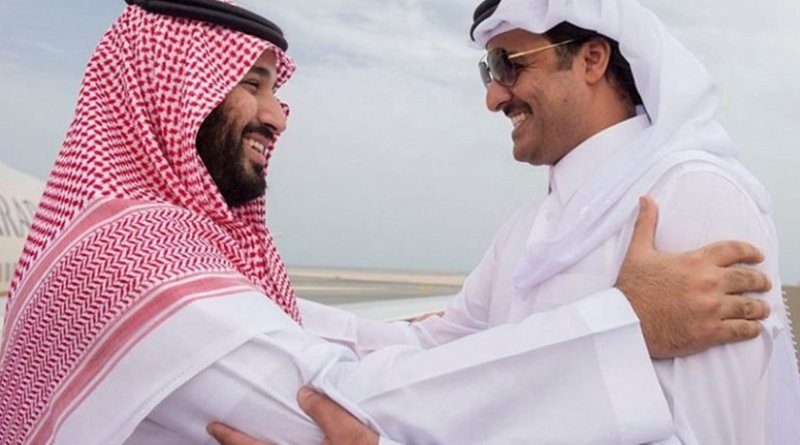Relations between Qatar and Saudi Arabia have improved following the signing of the Al Ula declaration in January.
Qatar’s Amir Sheikh Tamim bin Hamad Al Thani received a written message from Saudi Crown Prince Mohammed bin Salman, known commonly as MBS, on Monday, as ties between the neighbouring nations continue to warm following a three-year dispute.
The message highlighted the strong fraternal relations between the two Gulf nations and ways of supporting and strengthening these ties, as well as the most prominent regional and international developments, Qatar’s state news agency reported.
The message was delivered by Saudi Arabia’s Ambassador to Qatar Prince Mansour bin Khalid bin Farhan Al-Saud, the first ambassador to Qatar since the two nations reconciled following the Gulf blockade in 2017.
Qatar’s amir received Al-Saud in his office at the Amiri Diwan on Monday, where the Saudi official conveyed the greetings of King Salman bin Abdulaziz Al Saud of Saudi Arabia and his son, the crown prince.
Qatari-Saudi relations have improved since the two countries signed the Al Ula reconciliation agreement in January to end a political rift that saw the severance of all diplomatic and trade ties for more than three years.
Saudi Arabia, the United Arab Emirates, Bahrain, and Egypt cut diplomatic and trade relations with Qatar in 2017, accusing Doha of supporting terrorist activities across the region. Doha has vehemently and repeatedly denied those allegations.
Recent months have shown great strides towards Saudi-Qatar cooperation.
Earlier this month, Qatar’s border with Saudi Arabia was moved further towards the kingdom, expanding the peninsula’s geographical boundaries.
Khawr al Udayd is located in Al Wakrah Municipality in southeast Qatar, on the border with Saudi Arabia. The Qatari flag was reached following the agreement with the Kingdom on demarcating the border between both nations.
The expansion is part of a deal reached with Saudi Arabia to return full sovereignty of the southern shore of the Khor al Udeid to Qatar, Andreas Krieg, Associate Professor in security studies at King’s College London, explained to Doha News.
“This deal predates the Gulf Crisis. The handover of that territory from Saudi Arabia to Qatar was meant to happen earlier, but this project was not taken forward as the Gulf Crisis unravelled. As part of the Al Ula agreement, the two have now finalized the handover. This is a trust-building measure that is symbolic of improving relations between Qatar and Saudi Arabia,” the expert added.
Qatar-Saudi relations
In August, Qatari and Saudi delegations met to establish a coordination council to advance bilateral relations and partnerships between the two Gulf nations as part of Saudi’s Vision 2030 and Qatar’s National Vision 2030.
The same month also saw Saudi Foreign Minister Prince Faisal bin Farhan al-Saud saying relations between Saudi Arabia and Qatar were “very good”.
In addition, Doha appointed its newest envoy to Riyadh, marking the official restoration of diplomatic ties between the two states.
Amir Sheikh Tamim bin Hamad Al Thani appointed Al Attiyah as the country’s first ambassador to Saudi Arabia, the first such appointment since the 2017 GCC crisis erupted.
This came two months after Doha received its first Saudi Ambassador Prince Mansour bin Khalid bin Farhan in June, which was seen as a major step toward restoring ties between the two neighbouring countries.
In September, Amir Tamim was pictured with Saudi Crown Prince Mohammed bin Salman and UAE’s National Security Advisor Sheikh Tahnoon bin Zayed after a “cordial” meeting in the Red Sea.
The image of the three Gulf officials, all pictured donning casual shorts and shirts, went viral online.
Qatar’s Amir Sheikh Tamim bin Hamad Al-Thani has also participated in the Middle East Green Initiative Summit in Riyadh last month at the invitation of Saudi Crown Prince Mohammed bin Salman [MBS].
The participation of Sheikh Tamim in Riyadh is yet another indicator of developing relations between Doha and Riyadh, both of which were involved in a bitter dispute that left Qatar blockaded for three years.
On the region level, Doha has also echoed its willingness to mediate between Riyadh and Tehran to ease regional tensions since Qatar and Saudi Arabia restored diplomatic ties after a four-year bitter dispute between GCC member states.
“We want a quiet region. We hold consultations with Iran and keep our channels open with Tehran. We do not want to see a nuclear race in the region,” said Qatar’s Foreign Minister Sheikh Mohammed bin Abdulrahman Al-Thani in an interview with the US Council on Foreign Relations [CFR] in September.
Follow Doha News on Twitter, Instagram, Facebook and Youtube







